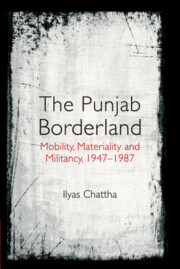
- Cited by 4
-
Cited byCrossref Citations
This Book has been cited by the following publications. This list is generated based on data provided by Crossref.
Chaturvedi, Sanjay 2024. The Futures of Borders and Geopolitics in South Asia. p. 59.
Roy, Anjali Gera 2024. Healing the Bloody Line: Suturing Indians and Pakistanis into Hindi Cinema and Pakistani Telesoaps. Journal of Borderlands Studies, p. 1.
Matanzima, Joshua 2024. The Materiality of Lake Kariba. p. 273.
Farrukhi, Ghazal Asif 2024. Wonders within domestic encounters: three women from Elias’ Khwabnama . Inter-Asia Cultural Studies, Vol. 25, Issue. 4, p. 594.
- Publisher:
- Cambridge University Press
- Online publication date:
- November 2021
- Print publication year:
- 2022
- Online ISBN:
- 9781009049184


